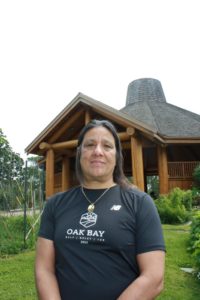From Criminal Justice student to Indigenous Studies program chair to executive director of Eyēʔ Sqȃ’lewen, or The Centre for Indigenous Education & Community Connections, Todd Ormiston’s time at Camosun College has truly come full circle.
Ormiston became chair of the Indigenous Studies program in 2017, and in that time he’s had an immense influence and transformation on the program that will carry on as he transitions into his new executive director position.
“Part of my role as chair was to help develop, implement, and monitor Indigenous programs within Camosun College,” says Ormiston. “We offer Indigenous social work classes, as well, that are one-off courses, and we get students interested across the college.”

Now, as executive director, his role shifts slightly, but Ormiston still aims to influence Indigenous education and transform it locally, as well as internationally.
“The biggest responsibility of this is to help guide Indigenous education within the college, and within our Indigenous communities that we’re connected to locally, as well as nationally and internationally,” he says. “I often say this: you want to create the lateral transformation, or lateral change, on the ground within… and then the vertical is really trying to ensure that students can move up, or increase their knowledge about Indigenous peoples and histories.”
Throughout Ormiston’s various roles at Camosun, he’s developed and carried a powerful philosophy that has helped him achieve this change at the college.
“My own philosophy is that Indigenous awareness creates understanding, which then creates a form of consensus,” he says, “and I honestly believe that then creates transformation for people.”
Evidence of Ormiston’s goals at Camosun has already taken shape with a new certification in Ways of Indigenous Leadership and Learning, which starts in September.
“What’s unique about this is we’re going to have up to 14 learners from New Zealand and Canada do what is called a blended program,” he says. “Primarily online, there are two opportunities where Canadian students can go to New Zealand and two courses where students from New Zealand will come over and meet the students face to face… The students will go out and camp on the land and learn about Indigenous land-based practices. It’s quite unique.”
Ormiston is keeping an eye on the Centre’s future, too. He has big plans for it, hoping that with these new unique programs he’s implementing, the Centre will eventually be able to become self-determining.
“What I hope is that Eyēʔ Sqȃ’lewen will become an institute within an institute,” he says. “We will become self-determining in deciding what our centre will provide as services that will be self-sufficient, meaning that we can have our own admin, our own direction, and yet still be connected to the college’s strategic plan.”
Since Ormiston will be executive director while a flood of new students arrive at Camosun in the fall, he hopes that Eyēʔ Sqȃ’lewen continues to be a warm and inviting space for all students.
“I think the biggest thing within Eyēʔ Sqȃ’lewen is we want to continue to create a welcoming space for Indigenous and non-Indigenous students,” he says, “to learn from each other and be able to understand different ways of knowing and doing.”
Ormiston says that it’s important to create a space like that for new and returning students, as well as a place that nurtures kindness and respect, especially with the current state of the world.
“I often say it takes one warrior at a time as we start to understand different ways of knowing and being and appreciate diversity that can spread… especially in a world where there’s so much anger and hate,” he says. “We need to espouse the values of love and respect and honour and trust and sharing those kind of things. Those are really important.”
